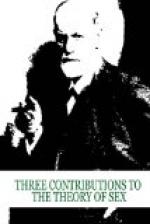One would thus be forced to the assumption, which if I am not mistaken is quite generally adopted, that the accumulation of sexual substance produces and maintains the sexual tension. The pressure of these products on the walls of their receptacles acts as an excitant on the spinal center, the state of which is then perceived by the higher centers which then produce in consciousness the familiar feeling of tension. If the excitation of erogenous zones increases the sexual tension, it can only be due to the fact that the erogenous zones are connected with these centers by previously formed anatomical connections. They increase there the tone of the excitation, and with sufficient sexual tension they set in motion the sexual act, and with insufficient tension they merely stimulate a production of the sexual substance.
The weakness of the theory which one finds adopted, e.g., in v. Krafft-Ebing’s description of the sexual process, lies in the fact that it has been formed for the sexual activity of the mature man and pays too little heed to three kinds of relations which should also have been elucidated. We refer to the relations as found in the child, in the woman, and in the castrated male. In none of the three cases can we speak of an accumulation of sexual products in the same sense as in the man, which naturally renders difficult the general application of this scheme; still it may be admitted without any further ado that ways can be found to justify the subordination of even these cases. Nevertheless one should be cautious about burdening the factor of accumulation of sexual products with actions which it seems incapable of supporting.
Overestimation of the Internal Genitals.—That sexual excitement can be independent to a considerable extent of the production of sexual substance seems to be shown by observations on castrated males, in whom the libido sometimes escapes the injury caused by the operation, although the opposite behavior, which is really the motive for the operation, is usually the rule. It is therefore not at all surprising, as C. Rieger puts it, that the loss of the male germ glands in maturer age should exert no new influence on the psychic life of the individual. The germ glands are really not the sexuality, and the experience with castrated males only verifies what we had long before learned from the removal of the ovaries, namely that it is impossible to do away with the sexual character by removing the germ glands. To be sure, castration performed at a tender age, before puberty, comes nearer to this aim, but it would seem in this case that besides the loss of the sexual glands we must also consider the inhibition of development and other factors which are connected with that loss.




